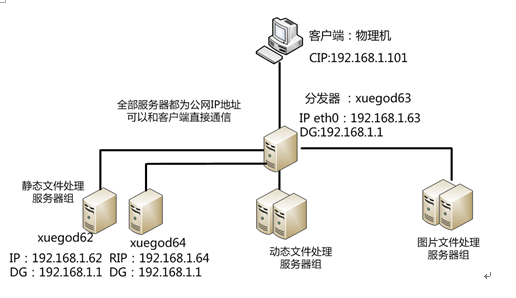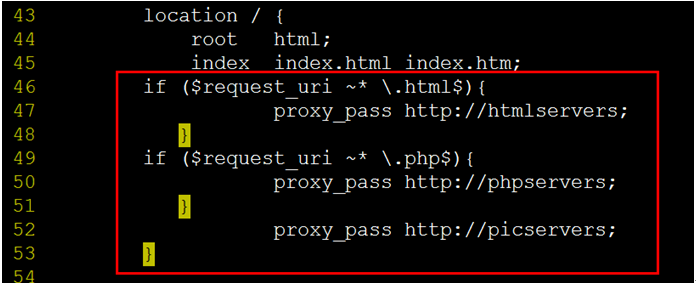使用nginx实现动静分离的负载均衡集群
一、概述:
LB负载均衡集群分两类: LVS (四层)和 nginx或haproxy (七层)
客户端通过访问分发器的VIP来访问网站
|
现在应用更复杂,比如现在网站页面有: .php .html .png .jpeg .jsp 等, 有动态页面有静态页面。
静态页面一般是不变的,想访问更快些,可以学习SQUID。
|
但是前面的LVS是四层的。基于IP的。现在需要在应用层基于不同的应用进行分发。
|
七层LB , Nginx / Haproxy都可以支持7层LB
现在实现以下功能,拓扑图:

工作中,希望这样:
静态文件处理:可以使用nginx 或apache
动文件处理: apache ,tomcat
图片文件处理: squid
使用nginx实现动静分离的负载均衡集群
Nginx 负载均衡基础知识
Nginx 的 upstream 负载的5种方式,目前最常用 前3 种方式
1)、轮询(默认)
每个请求按时间顺序逐一分配到不同的后端服务器,如果后端服务器 down 掉,能自动剔除。
2)、weight
指定轮询几率,weight 和访问比率成正比,用于后端服务器性能不均的情况。
3)、ip_hash
每个请求按访问 ip 的 hash 结果分配,这样每个访客固定访问一个后端服务器,可以解决 session 的问题。
4)、fair(第三方)
按后端服务器的响应时间来分配请求,响应时间短的优先分配。
5)、url_hash(第三方) url哈西
按访问url的hash结果来分配请求,使同样的url定向到同一个后端服务器,后端服务器为缓存时比较有效
二、实验操作:
1、源码编译安装nginx
1 2 3 4 5 6 7 8 9 10 11 12 13 14 15 16 17 18 19 20 21 22 23 24 25 26 27 28 29 30 31 32 33 34 35 36 37 38 39 40 41 42 43 44 45 46 47 48 49 50 51 52 53 54 55 56 57 58 59 60 61 | 1、安装nginx时必须先安装相应的编译工具和相关依赖[root@xuegod63 ~]#yum -y install gcc gcc-c++ autoconf automake zlib zlib-devel openssl openssl-devel pcre pcre-develzlib:nginx提供gzip模块,需要zlib库支持openssl:nginx提供ssl功能pcre:支持地址重写rewrite功能安装nginx:[root@xuegod63 ~]# ll nginx-1.12.2.tar.gz -h #整个nginx文件不到只813K,很小-rw-r--r-- 1 root root 813K Jul 14 20:17 nginx-1.12.2.tar.gz [root@xuegod63 ~]# tar -zxvf nginx-1.12.2.tar.gz -C /usr/local/src/[root@xuegod63 ~]# cd /usr/local/src/nginx-1.12.2/[root@xuegod63 nginx-1.12.2]# ./configure --prefix=/usr/local/nginx --with-http_dav_module --with-http_stub_status_module --with-http_addition_module --with-http_sub_module --with-http_flv_module --with-http_mp4_module查看参数:[root@xuegod63 nginx-1.12.2]# ./configure --help | grep mp4参数:--with-http_dav_module 启用ngx_http_dav_module支持(增加PUT,DELETE,MKCOL:创建集合,COPY和MOVE方法)默认情况下为关闭,需编译开启--with-http_stub_status_module 启用ngx_http_stub_status_module支持(获取nginx自上次启动以来的工作状态)--with-http_addition_module 启用ngx_http_addition_module支持(作为一个输出过滤器,支持不完全缓冲,分部分响应请求)--with-http_sub_module 启用ngx_http_sub_module支持(允许用一些其他文本替换nginx响应中的一些文本)--with-http_flv_module 启用ngx_http_flv_module支持(提供寻求内存使用基于时间的偏移量文件)--with-http_mp4_module 启用对mp4文件支持(提供寻求内存使用基于时间的偏移量文件)编译和安装: (查看CPU逻辑数cat /proc/cpuinfo | grep processor | wc -l)[root@xuegod63 nginx-1.12.2]# make -j 4 [root@xuegod63 nginx-1.12.2]# make install生成运行nginx的用户:[root@xuegod63 nginx-1.12.2]# useradd -u 8000 -s /sbin/nologin nginx[root@xuegod63 nginx-1.12.2]# id !$id nginxuid=8000(nginx) gid=8000(nginx) groups=8000(nginx)nginx主要目录结构:[root@xuegod63 nginx-1.12.2]# cd /usr/local/nginx/[root@xuegod63 nginx]# lsconf html logs sbinconf #配置文件html #网站根目录logs #日志sbin #nginx启动脚本主配置文件:[root@xuegod63 nginx]# ls /usr/local/nginx/conf/fastcgi.conf fastcgi_params.default mime.types nginx.conf.default uwsgi_paramsfastcgi.conf.default koi-utf mime.types.default scgi_params uwsgi_params.defaultfastcgi_params koi-win nginx.conf scgi_params.default win-utf启动nginx:[root@xuegod63 nginx]# lsconf html logs sbin[root@xuegod63 nginx]# ./sbin/nginx [root@xuegod63 nginx]# netstat -antup|grep 80tcp 0 0 0.0.0.0:80 0.0.0.0:* LISTEN 7857/nginx: master [root@xuegod63 nginx]# ln -s /usr/local/nginx/sbin/nginx /usr/local/sbin/[root@xuegod63 nginx]# nginx -tnginx: the configuration file /usr/local/nginx/conf/nginx.conf syntax is oknginx: configuration file /usr/local/nginx/conf/nginx.conf test is successful[root@xuegod63 nginx]# nginx -vnginx version: nginx/1.12.2 |
测试:
http://192.168.1.63/

2.nginx服务日常操作
配置nginx成为分发器,实现动静分离
1 2 3 4 5 6 7 8 9 10 11 12 13 14 15 16 17 18 19 20 21 22 23 24 25 26 27 28 | [root@xuegod63 conf]# cd /usr/local/nginx/conf #配置文件目录 [root@xuegod63 conf]# cp nginx.conf nginx.conf.bak #备份一下配置文件[root@xuegod63 conf]# vim nginx.conf[root@xuegod63 conf]# nginx -tnginx: the configuration file /usr/local/nginx/conf/nginx.conf syntax is oknginx: configuration file /usr/local/nginx/conf/nginx.conf test is successful[root@xuegod70 conf]# nginx -s reload改:# user nobody;为:user nginx nginx; 改: 43 location / { 44 root html; 45 index index.html index.htm; #在location / { 。。。} 中添加以下内容 #定义分发策略location / { root html; index index.html index.htm; if ($request_uri ~* \.html$){ proxy_pass http://htmlservers; } if ($request_uri ~* \.php$){ proxy_pass http://phpservers; } proxy_pass http://picservers; } |

1 2 3 4 5 6 7 8 9 10 11 12 13 14 15 16 17 18 19 20 21 22 23 24 25 | 把以下内容注释掉,否则php文件直接在nginx服务器上解析了,不再解析给后端服务器: 72 # location ~ \.php$ { 73 # root html; 74 # fastcgi_pass 127.0.0.1:9000; 75 # fastcgi_index index.php; 76 # fastcgi_param SCRIPT_FILENAME /server/nginx-1.8.0/html$fastcgi_script_name; 77 # include fastcgi_params; 78 # }#定义负载均衡设备的 Ip#定义负载均衡设备的 Ip在配置文件nginx.conf的最后一行}前,添加以下内容: upstream htmlservers { #定义负载均衡服务器组名称 server 192.168.1.62:80; server 192.168.1.64:80; } upstream phpservers{ server 192.168.1.62:80; server 192.168.1.64:80; } upstream picservers { server 192.168.1.62:80; server 192.168.1.64:80; }#后期工作中,根据工作中的需要,配置成具体业务的IP地址 |
保存退出。
重新加载nginx服务器配置文件
1 2 3 4 | [root@xuegod63 conf]# nginx -tnginx: the configuration file /usr/local/nginx/conf/nginx.conf syntax is oknginx: configuration file /usr/local/nginx/conf/nginx.conf test is successful[root@xuegod63 conf]# nginx -s reload |
3.配置后端服务器
1 2 3 4 5 6 7 8 9 10 11 12 13 | [root@xuegod62 ~]## yum install httpd php -y生成静态测试文件:[root@xuegod62 ~]# echo 192.168.10.71 > /var/www/html/index.html[root@xuegod62 ~]# vim /var/www/html/test.php生成动态测试文件:[root@xuegod62 html]#vim /var/www/html/test.php #写如以下内容:192.168.1.62-php<?phpphpinfo();?>启动apache服务器:[root@xuegod62 html]# service httpd restart |
生成图片文件:
上传如下图片,到xuegod62网站/var/www/html/目录下:

然后进行测试:http://192.168.1.63
三、测试性能
1 2 3 4 5 6 7 8 9 10 11 12 13 14 15 16 | 扩展: 文件打开数过多[root@xuegod64 html]# ab -n 1000 -c 1000 http://192.168.1.62/index.html #运行正常[root@xuegod64 html]# ab -n 2000 -c 2000 http://192.168.1.62/index.html #报错This is ApacheBench, Version 2.3 <$Revision: 655654 $>Copyright 1996 Adam Twiss, Zeus Technology Ltd, http://www.zeustech.net/Licensed to The Apache Software Foundation, http://www.apache.org/Benchmarking 192.168.1.62 (be patient)socket: Too many open files (24) # 测试时,一次打开的socket文件太多。#ulimit -a #查看#ulimit -n1024系统默认一个进程最多同时允许打开1024的文件解决:#ulimit -n 10240 #报错的解决方法 |
四、Nginx负载的5种策略设置方法:
1、轮询(默认)
每个请求按时间顺序逐一分配到不同的后端服务器,如果后端服务器down掉,能自动剔除。
upstream backserver {
server 192.168.1.62;
server 192.168.1.64;
}
2、指定权重
指定轮询几率,weight和访问比率成正比,用于后端服务器性能不均的情况。
upstream backserver {
server 192.168.1.62 weight=1;
server 192.168.1.64 weight=2;
}
3、IP绑定 ip_hash
每个请求按访问ip的hash结果分配,这样每个访客固定访问一个后端服务器,可以解决session的问题。
upstream backserver {
ip_hash;
server 192.168.1.62:80;
server 192.168.1.64:80;
}
4、fair(第三方)
按后端服务器的响应时间来分配请求,响应时间短的优先分配。
upstream backserver {
server server1;
server server2;
fair;
}
5、url_hash(第三方)
按访问url的hash结果来分配请求,使每个url定向到同一个后端服务器,后端服务器为缓存时比较有效。
upstream backserver {
server squid1:3128;
server squid2:3128;
hash $request_uri;
hash_method crc32;
}
总结,扩展:
如有tomcat ,apache,squid 配置为如下:
[root@xuegod63 conf]# vim nginx.conf # 在最后添加以下内容。 定义服务器组
upstream tomcat_servers {
server 192.168.1.2:8080;
server 192.168.1.1:8080;
server 192.168.1.11:8080;
}
upstream apache_servers {
server 192.168.1.5:80;
server 192.168.1.177:80;
server 192.168.1.15:80;
}
upstream squid_servers {
server 192.168.1.26:3128;
server 192.168.1.55:3128;
server 192.168.1.18:3128;
}




【推荐】国内首个AI IDE,深度理解中文开发场景,立即下载体验Trae
【推荐】编程新体验,更懂你的AI,立即体验豆包MarsCode编程助手
【推荐】抖音旗下AI助手豆包,你的智能百科全书,全免费不限次数
【推荐】轻量又高性能的 SSH 工具 IShell:AI 加持,快人一步
· 开发者必知的日志记录最佳实践
· SQL Server 2025 AI相关能力初探
· Linux系列:如何用 C#调用 C方法造成内存泄露
· AI与.NET技术实操系列(二):开始使用ML.NET
· 记一次.NET内存居高不下排查解决与启示
· 被坑几百块钱后,我竟然真的恢复了删除的微信聊天记录!
· 没有Manus邀请码?试试免邀请码的MGX或者开源的OpenManus吧
· 【自荐】一款简洁、开源的在线白板工具 Drawnix
· 园子的第一款AI主题卫衣上架——"HELLO! HOW CAN I ASSIST YOU TODAY
· Docker 太简单,K8s 太复杂?w7panel 让容器管理更轻松!